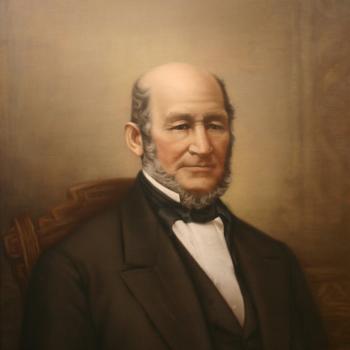What makes Bell so attractive? Many pastors and leaders want to create this kind of devotion. Some of the criticism of Bell is based, at least in part, on envy of his ability to attract an audience. What is this "charismatic bond" between Bell and his listeners?
While attendees of megachurches often say that the pastor is not the reason they attend, there is little doubt that these "energy stars" attract and create a fusion of joy, delight, and motivation that create congregations that glow with what they call the "spirit" of God. My interest in the work of Rob Bell stemmed from my work as a sociologist; I know that skilled leaders generate a collective effervescence that buoys groups and charges crowds with a kind of delirium that humans want-and even need. This can happen in any group, but not every leader can produce this kind of multisensory mélange of input that is often called the "feeling of the spirit of God," or "the touch of God." Whatever language you use to describe it, I've seen it lift people out of their seats.
Despite his popularity, Bell's rock star persona repulses many people. Outsiders, particularly those from non-religious backgrounds, find it manipulative or dangerous. Others, including those in the evangelical community, and particularly in response to Love Wins, have thrown him overboard. John Piper, the godfather of the neo-Reformed movement in American evangelical Christianity, tweeted, "Farewell Rob Bell," which he later said was meant as a friendly remark. Albert Mohler, president of the Southern Baptist Theological Seminary, called Bell's views on hell an "unscriptural sentimentalism . . . incompatible with [God's] hatred of sin." And book after book have detailed Bell's heretical ways.
So, is Rob Bell a heretic? Does this question even make sense in an American culture that has so many kinds of Christianity? Just what kind of Christian is he? Whatever one thinks of Rob Bell, there is no denying the intense controversy surrounding him in the American religious landscape—and that these contentions raise important questions for multiple audiences:
Should evangelicals be afraid of him?
Should young Reformed evangelicals see him as their mentor? Should Wesleyans call him one of their own?
Should pastors, of whatever label, take him as a model?
Should the spiritual but not religious see him as a kind of spiritual avatar?
The onrush of responses to his work indicates that many see him as a voice of faith. Increasing numbers of evangelicals, particularly young evangelicals, are asking questions about the faith. They are questioning the exclusive claims of Christianity and hoping for a more fruitful relationship with cultures outside the faith community; they want answers to their toughest questions.
One of the most fascinating questions this book will explore is the degree and depth of Bell's influence on the American Christian community. As a scholar of American religion, I believe that the decline and even the end of the Protestant establishment is an inevitable outcome of our religious history. The Protestant mainline is no longer mainline; establishment Protestantism simply doesn't attract a large audience any more. The evangelical networks don't fare much better. It, too, is fragmented, and some argue that we've seen the "End of Evangelicalism." The center of American Christianity no longer holds, if it ever did. Is Bell's work and person catalyzing a new kind of American Christianity? And what are the contours of this new form?




